When we first unboxed the ZHRUNS Digital Piano 88 Key, we expected another entry-level keyboard with a long spec sheet and modest real-world performance. What greeted us instead was a surprisingly full-featured instrument: a full-size 88-key board with progressive weighted action, a three-pedal setup, dual headphone jacks for duet practice, USB/MIDI and audio I/O, built-in speakers, and a host of onboard sounds, rhythms and learning functions.In short, it promises the look and many of the conveniences of a home digital piano while keeping portability and practice-friendly features front and center.
Over several sessions we tried everything from quiet late-night practice (two headphones plugged in, no complaints from the neighbors) to split keyboard duets, MIDI lessons with our laptop, and a handful of demo songs to test the tone and touch.The progressive weight of the keys and the sustain pedal were especially important for us as we focused on how well the instrument supports technique advancement. We also explored the LCD menus, metronome and recording functions to see how useful they are for learners.
In the review that follows, we’ll walk through how the ZHRUNS performs in key areas-touch and tone, connectivity and learning features, build and portability-and where it might surprise or fall short of expectations for beginners and adult learners. If you’re weighing a portable,full-size option for home practice or lessons,here’s what our first-hand time with this model revealed.
Our overview and First Impressions of the ZHRUNS Digital Piano with Eighty Eight Weighted Keys

Our first run-through left us impressed by how closely the keyboard mimics an acoustic piano without the bulk. The 88-key progressive weight action combined with the French DREAM 5704 sound engine gives notes a satisfying clarity and dynamics – touch response feels pronounced and pleasant for longer sessions. Connectivity options are generous: USB/MIDI along with audio in/out and two headphone jacks make it easy for simultaneous practice or connecting to learning apps. We also appreciated the practical 3-pedal setup (soft,sustain,sostenuto) and the built-in stereo speakers that save space while still sounding full. In short, strong fundamentals for both beginners and more experienced players.
On features, the unit packs useful tools without being overwhelming: split/dual modes, 41 demo songs, 200 rhythms, 64-note polyphony, recording/playback and an LCD for quick navigation. The dual-headphone capability and the keyboard’s ability to split into left/right zones for four-handed play make it ideal for lessons and duet practice. Quick spec snapshot:
- Sound / Keys: 88 fully weighted, progressive
- Connectivity: USB/MIDI, audio in/out, 2 headphone jacks
- Extras: 3 pedals, recording, metronome, 200 rhythms
| Feature | What We Noticed |
|---|---|
| Action | Responsive, piano-like |
| Sound Engine | Warm, clear sampling |
Ready to try it yourself? See current price and reviews on Amazon
What We Noticed About the semi Weighted Keys Sound Response Sustain Pedal and Build Quality

We were pleasantly surprised by the key action and tonal reaction. Although the unit is often described as semi-weighted, our play tests revealed a progressive feel across the 88 keys – heavier in the lower register and lighter toward the treble – which makes dynamics and phrasing more expressive then a simple synth-style keyboard. The keyboard uses the French DREAM 5704 sound sampling and offers velocity sensitivity and 64-note polyphony, so sustained chords and layered voices hold up well without obvious dropouts. The included sustain pedal (part of a 3-pedal set) performs reliably for basic legato and pedal work; it gives notes good decay and helps emulate acoustic phrasing, though it lacks the nuanced half-pedal response of a high-end studio pedal. What stood out for us in practice:
- Responsive touch: clear weight progression aids technique development.
- Sound sustain: roomy built-in stereo speakers and decent sampled tails.
- Sustain pedal: firm, functional – fine for practice, modest for advanced nuance.
Build quality balances portability with durability: the chassis is lightweight plastic but feels solid for home or classroom use, and connectors (USB/MIDI/AUDIO/HEADPHONE) are straightforward and snug. two headphone jacks and the split/dual modes make duet practice painless, and features like the LCD, recording/playback, metronome and 200 rhythms add practical value beyond the keys themselves. For a quick reference, here’s a short spec snapshot we found useful:
| Feature | What we Noticed |
|---|---|
| Keys | 88 progressive/semi-weighted |
| Polyphony | 64 notes |
| Pedals | 3 (Soft/Sustain/Sostenuto) |
| sound Source | French DREAM 5704 samples |
If you want to try it for yourself, check current pricing and availability here: See Latest Price on Amazon
Our Detailed Insights and Practical Recommendations for Beginners Adults and Home Practice

We appreciated how the instrument blends a realistic touch and flexible learning tools: the progressive-weight 88-key action gives a convincing piano feel while the built‑in French DREAM 5704 sound engine and 64-note polyphony keep chords clear even with layered tones and rhythms. The trio of pedals (Soft/Sustain/Sostenuto), dual headphone jacks for silent duet practice, and USB/MIDI/AUDIO connectivity let us switch between focused home practice and interactive app-based lessons with ease. The unit’s LCD feedback, split/dual modes, 41 demo songs and 200 rhythms make it simple for beginners and adults to stay engaged, and the recording/playback function helps us track incremental improvements over weeks.
- Weighted keys: builds finger strength and realistic touch response.
- Dual headphones: ideal for late-night practice or teacher-student sessions without disturbing others.
- USB/MIDI: connect to learning apps or a computer for guided lessons and virtual instruments.
- Three pedals: practice expressive techniques early-sustain and sostenuto expand repertoire possibilities.
- Recording & metronome: cement timing and listen back to refine phrasing.
For practical home routines we recommend short, focused sessions and using the instrument’s features to structure practice: enable the metronome and start at a comfortable tempo, use split or four‑hand mode for duet lessons, and record short runs to monitor progress. Adults returning to piano should aim for consistent 20-30 minute daily practice, alternating technical drills on the weighted keys with simple repertoire using the demo sounds and rhythms to keep motivation high. When connecting to a computer via MIDI/USB, use the device as a controller for learning apps but keep the internal speakers for quick, portable use-headphones are perfect for late hours and dual-jack sessions with a partner or teacher.
| Setting | Why | Suggested Use |
|---|---|---|
| Polyphony (64) | Avoids dropped notes during layers | Good for beginners & most pieces |
| Metronome | Improves timing | Start at 60-80 bpm |
| Split/Dual Mode | Teacher/student or duet practice | Use in lessons, four‑hand pieces |
| Headphones | quiet, focused practice | Use at night or with partner |
Check current price and availability
Pros & Cons

What we liked
- Full-range keyboard: The 88-key layout gives us the whole piano palette to practice scales, classical repertoire, and modern pieces without compromise.
- Weighted feel for realism: The progressive/semi-weighted action (the listing is a touch inconsistent) still delivers a satisfying touch and better resistance than typical synth keys.
- Connectivity for learning: USB/MIDI and audio I/O let us link to apps, DAWs, and online lessons easily – ideal for students and self-learners.
- Two headphone outputs: Dual headphone jacks are a practical win for duet lessons and silent practice without disturbing others.
- Three-pedal setup: Soft, sustain, and sostenuto pedals make our technique work more meaningful and closer to an acoustic instrument.
- Feature-rich control: LCD, split/sustain/recording functions, metronome, demo songs, and 200 rhythms add versatility for practice and composition.
- Built-in speakers: For casual playing and performance at home the onboard stereo speakers are convenient and presentable.
- Duet/split mode: The ability to split the keyboard for four-handed or teacher-student play is excellent for lessons and collaboration.
What we didn’t love
- ambiguous weight description: Product copy mixes “fully weighted” and “semi-weighted” – we’d like clearer labeling to know whether it truly matches an acoustic feel.
- Portability vs.size: It’s marketed as portable, but a full 88-key instrument is bulky compared with compact keyboards - moving it often could be awkward.
- Polyphony limits: 64-note polyphony can become restrictive when stacking tones or using heavy sustain and backing tracks.
- Speaker expectations: Built-in speakers are handy, but they won’t replace external monitors for serious recording or performance clarity.
- Learning extras unclear: The piano offers many teaching features, yet we’d prefer clearer on-screen guidance or bundled software details.
- Accessory details missing: the listing doesn’t clearly state which cables or stands are included, so we caution budgeting for extras.
- Finish and durability unknown: the white finish is striking, but long-term build quality isn’t fully clear from specs alone – we recommend a hands-on test if possible.
Quick snapshot
| top Pros | Top Cons |
|---|---|
| Full 88-key range | size reduces portability |
| Dual headphone jacks | 64-note polyphony |
| USB/MIDI connectivity | Weight description is ambiguous |
We find the ZHRUNS 88-key digital piano a compelling option for beginners and practice-focused players who want a feature-packed instrument without stepping directly into acoustic piano ownership. It blends practical teaching tools and connectivity with the feel of a weighted keyboard – but if you need concert-grade speakers, uncompromising polyphony, or maximal portability, we’d urge a closer comparison.
Q&A
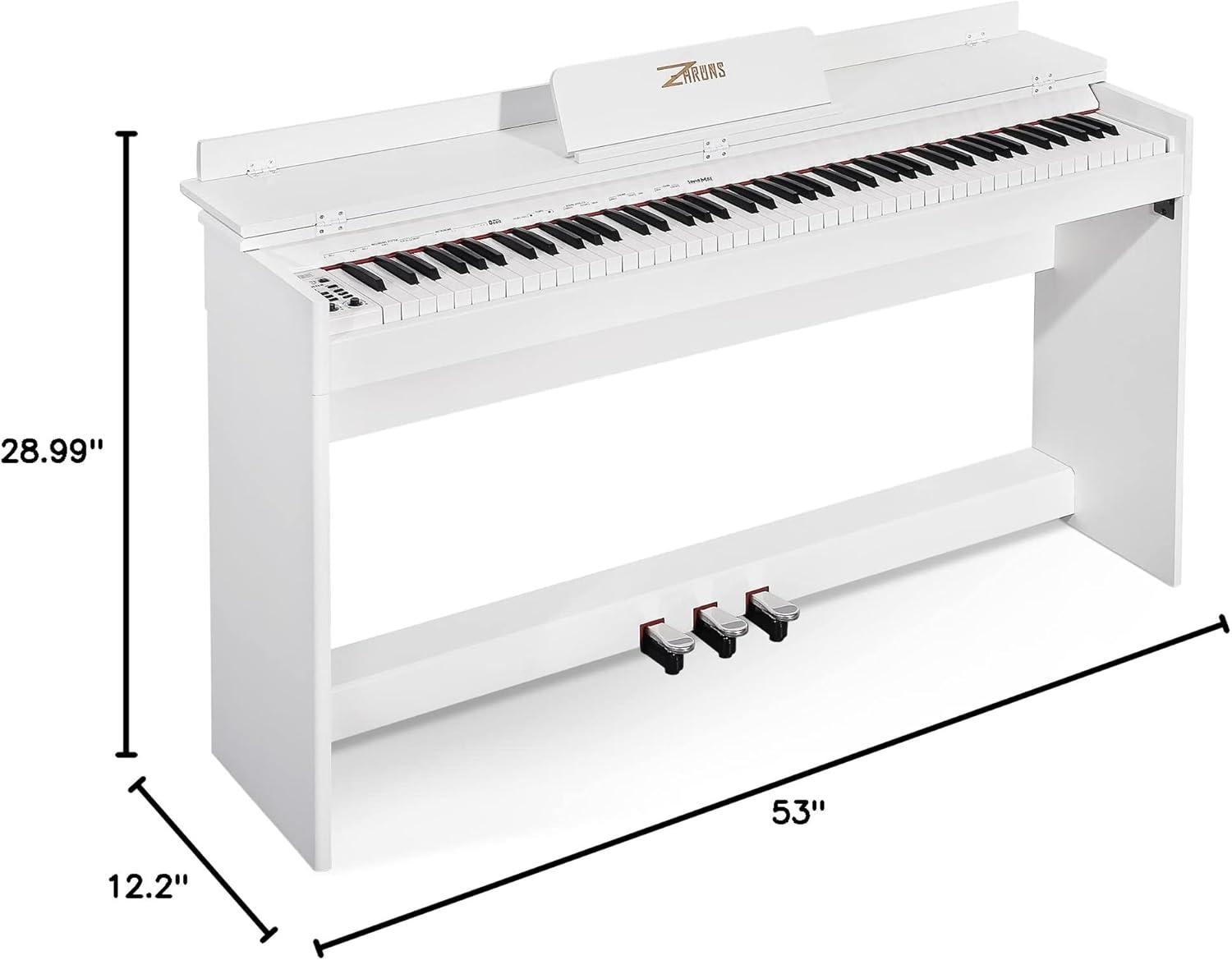
Q: Who is the ZHRUNS 88-key digital piano best suited for?
A: We see it as a bridge instrument – grate for beginners and hobbyists who want a full 88-key layout and useful teaching features without paying flagship digital-piano prices. Because it offers progressive/weighted action, split mode and dual headphones, we think it works well for adults learning later in life and for teachers or parents who want two people to practice together.
Q: Are the keys truly “fully weighted”?
A: the product literature is a bit inconsistent – some listings say semi-weighted, others say progressive/fully weighted with a DREAM 5704 sound source. In our experience the keyboard delivers noticeable resistance that’s heavier in the bass and lighter in the treble (progressive feel), so it feels closer to weighted action than basic synth keys, though it won’t perfectly replicate a high-end hammer-action concert grand.
Q: How does the piano sound?
A: The ZHRUNS uses the Dream 5704 digital sampling and offers a range of tones. We found piano voices that are pleasant and usable for practice and home performance; the built-in stereo speakers are clear for small rooms. Serious recording or large venues will benefit from plugging into external speakers or an interface via the audio out or USB/MIDI.
Q: What about the speakers and headphone options?
A: There are built-in stereo speakers that handle casual playing well. We especially liked the dual headphone jacks – two players can practice together without disturbing others, and private lessons are simple. Headphone output is the best option for late-night practice.
Q: Can two people play simultaneously?
A: Yes – the keyboard supports split mode and can be divided left/right for four-handed playing or teacher-student setups. Combined with two headphone jacks and the ability to assign different tones to each split, it’s easy for two people to play together.
Q: How good is the pedal system?
A: It comes with a 3-pedal setup (soft,sustain,sostenuto),which is a big plus. We found the sustain pedal behaviour to be effective for most repertoire, and having all three pedals makes the instrument more expressive than many entry-level boards.
Q: How many sounds, rhythms and polyphony does it offer?
A: The unit offers multiple tones and combos (piano + violin, guitar + violin, ensemble patches), 200 rhythms, 41 demo songs and 64-note polyphony. For most practice and play styles this is ample, but very dense layered passages or heavy use of stereo samples and effects could run into polyphony limits.
Q: What connectivity does it have?
A: It includes USB/MIDI, audio input/output, and headphone terminals. USB/MIDI lets us connect to a computer for lessons, notation software and virtual instruments; audio out allows connection to external speakers or mixers. We’d recommend checking whether your DAW needs a driver or just class-compliant USB.
Q: Can we record and use teaching functions?
A: Yes – there are onboard recording/playback functions, a metronome, and teaching modes. We used the record feature for quick practice reviews and found the metronome and lesson-oriented functions helpful for structured learning.
Q: Is the keyboard portable?
A: It’s marketed as portable,but remember it’s a full-size 88-key instrument. Compared with compact 61-key controllers it’s larger and heavier,so it’s portable between rooms or for occasional transport,but not ideal for daily gigging without a proper case and help.
Q: How’s the build quality and design?
A: The design leans modern and the finish is clean (the white model looks striking). Build quality is reasonable for the price point – solid enough for home use. We’d caution that long-term durability will depend on handling and care; always check reviews and the seller’s policy for specifics.
Q: Are there any notable downsides?
A: A few we noticed: the marketing sometimes mixes terms (semi-weighted vs fully weighted), so expectations should be moderated; built-in speakers are fine for home but not studio-grade; and the 64-note polyphony could limit complex arrangements. Also, warranty and after-sales support depend on the seller, so we advise verifying those details before purchase.
Q: How does it compare to an acoustic piano or high-end digital pianos?
A: It’s a practical, budget-friendly option for practice and learning.We don’t expect it to fully replicate the nuanced hammer action or acoustic resonance of a premium acoustic or flagship digital piano, but it provides a realistic playing experience for students and casual players at a fraction of the cost.
Q: Any tips if we decide to buy one?
A: Yes - pair it with a decent pair of headphones or external speakers for the best sound; use USB/MIDI to connect to learning apps and DAWs; experiment with split and dual modes for lessons; and consider a sturdy stand and bench if you’ll use it long-term. Also confirm return/warranty terms in case you need support.
If there’s a specific feature you want us to test or a comparison you’d like (for example, against Yamaha or Casio models), tell us and we’ll dig deeper.
Reveal the Remarkable

We came to the ZHRUNS 88-Key Digital Piano expecting a capable beginner instrument, and we left appreciating how many thoughtful features are packed into a surprisingly portable package. The fully weighted, progressive-action keyboard and French DREAM 5704 sampling give a satisfyingly piano-like touch and tone for practice and small performances; the split mode, dual headphone jacks and 3-pedal system invite duet practice and more expressive playing; and the USB/MIDI, audio I/O, recording and teaching functions make it easy to grow with lessons and apps. In short, it does much of what you’d want from an all-in-one home instrument without pretending to be a concert grand.
Having mentioned that, we also recognise the trade-offs inherent at this price point. Built-in speakers are convenient but won’t rival external monitors for nuanced tonal detail, and advanced players seeking an ultra-high-end action or deepest polyphony might look elsewhere. For beginners, hobbyists, classroom settings and anyone who values connectivity and duet-friendly features, though, the ZHRUNS presents a compelling balance of realism, functionality and value.If our hands-on impressions match what you’re looking for – a full-size, feature-rich digital piano that’s ready for lessons, practice and shared sessions – we think it’s worth considering. Explore current pricing and more details here:
See the ZHRUNS 88-Key Digital Piano on Amazon


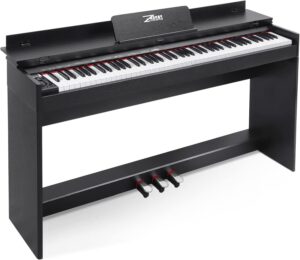
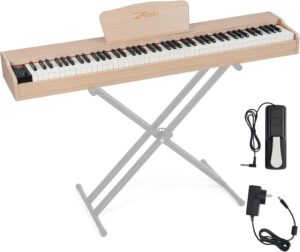
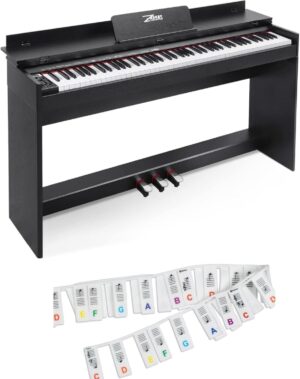
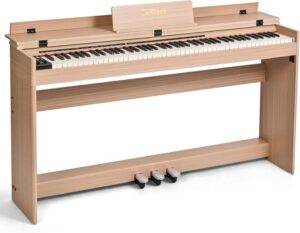
Reviews
There are no reviews yet.